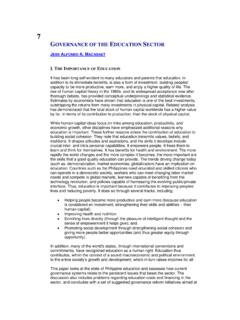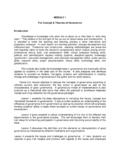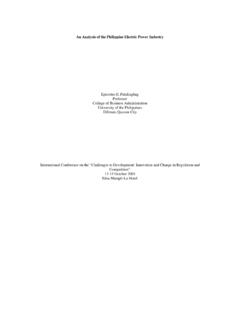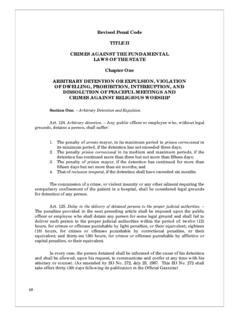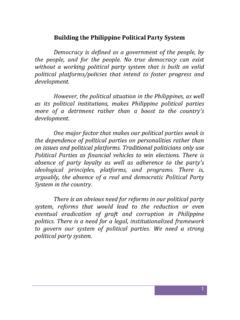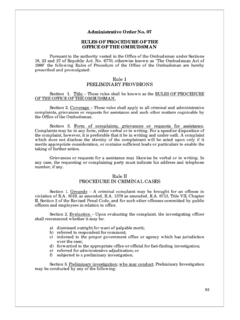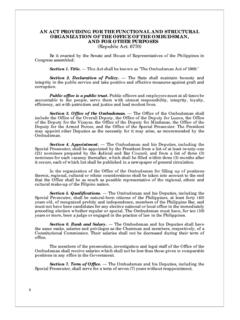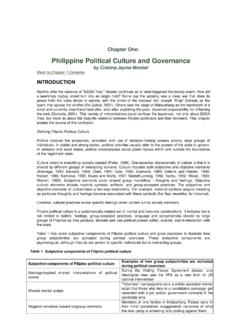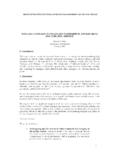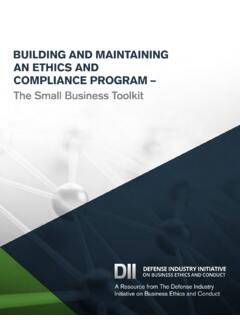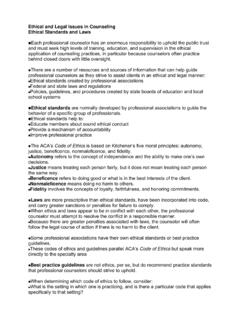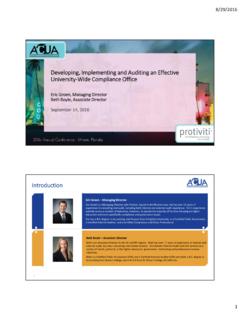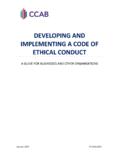Transcription of RULES IMPLEMENTING THE CODE OF CONDUCT …
1 RULES IMPLEMENTING THE CODE OF CONDUCT AND ETHICALSTANDARDS FOR PUBLIC OFFICIALS AND EMPLOYEES(REPUBLIC ACT NO. 6713)Pursuant to the provisions of Section 12 of Republic Act No. 6713, otherwise known as the Code of CONDUCT and Ethical standards for Public Officials and Employees, approved on February 20, 1989, and which took effect on March 25, 1989, conformably to Section 17 thereof, the following RULES are hereby adopted in order to carry out the provisions of the said Code:Rule ICoverageSection 1. These RULES shall cover all officials and employees in the government, elective and appointive, permanent or temporary, whether in the career or non-career service, including military and police personnel, whether or not they receive compensation, regardless of IIInterpretationSection 1.
2 These RULES shall be interpreted in the light of the Declaration of Policy found in Section 2 of the Code: It is the policy of the State to promote a high standard of ethics in public service. Public officials and employees shall at all times be accountable to the people and shall discharge their duties with utmost responsibility, integrity, competence and loyalty, act with patriotism and justice, lead modest lives, and uphold public interest over personal interest Rule IIIR eforms on Public Administrative SystemsSection 1. Every department, office and agency shall, as soon as practicable and in no case later than ninety (90) days from the effectivity of these RULES , start conducting value development programs for its officials and employees in order to strengthen their commitment to public service and help promote the primacy of public interest over personal interest in the performance of their duties.
3 Such programs and other parallel efforts on value development shall include, among other things, the following subject:a) Ethical and moral values;b) Rights, duties and responsibilities of public servants;c) Nationalism and patriotism;d) Justice and human rights;e) Democracy in a free and just society;30f)Philippine history, culture and tradition; andg) Socio-economic conditions prevailing in the country, especially in the depressed areas, and the need for a Code of CONDUCT and Ethical refresher courses and seminars and/or workshops to promote a high standard of ethics in public service shall be 2. Professional, scientific, technical trainings and education programs shall enhance to the highest degree, professionalism, excellence, intelligence and skills in the performance and discharge of duties and responsibilities of officials and employees.
4 These programs shall be conducted in all offices of the government and may include subjects that are enumerated in the preceding 3. It is the responsibility of every head of department, office and agency to ensure that officials and employees attend the value development program and participate in parallel value development 4. Every department office and agency shall CONDUCT continuing studies and analyses of their work systems and procedures to improve delivery of public services. Towards this end, such studies and analyses shall: (1) identify systems and procedures that lead or contribute to negative bureaucratic behavior; (2) simplify RULES and procedures to avoid red tape; and (3) devise or adopt systems and procedures that promote official and employee morale and department, office or agency shall develop a service guide or its functional equivalent which shall be regularly updated and made available to the transacting public.
5 A workflow chart showing procedures or flow of documents shall likewise be posted in conspicuous places in the department, office or agency for the informations and guidance of all request, the Department of Budget and Management shall assist departments, offices and agencies in the evaluation and adoption of work systems and procedures that will institutionalize a management climate conducive to public 5. Every department, office and agency shall consult the public they serve for the purpose of gathering feedback and suggestions on the efficiency, effectiveness and economy of services. They shall establish mechanism to ensure the CONDUCT of public consultation and hearings. Section 6. Every department, office and agency shall continuously CONDUCT research and experimentation on measures and adopt innovative programs which will provide motivation to officials and employees in raising the level of observance of public service ethical 7.
6 Every department, office and agency shall, in consultation with the Office of the Ombudsman, appoint or designate a Resident Ombudsman who shall act immediately on all request for public assistance referred to him by the Ombudsman and his Deputies. He shall be held accountable for the disposition of all requests for assistance.. Section 8. Government officials shall make themselves available to their staff for consultation and IVTransparency of Transaction and Access to InformationSection 1. Subject to reasonable conditions prescribed by law, the State adopts and implements a policy of full public disclosure of all its transactions involving public 2. It is the responsibility of heads of departments, offices and agencies to establish measures and standards that will ensure transparency of and openness in public transactions in their respective offices, such as in biddings, purchases, other financial transactions including contracts, status of projects, and all other matters involving public interest.
7 They shall establish information system that will inform the public of the following: (a) policies, RULES , and procedures; (b) work programs, projects, and performance targets; (c) performance reports; and (d) all other documents as may hereafter be classified as public public information shall be utilized solely for the purpose of informing the public of such policies, programs and accomplishments, and not to build the public image of any official or employee or to advance his own personal 3. Every department, office or agency shall provide official information, records or documents to any requesting public, except if:(a) such information, record or document must be kept secret in the interest of national defense or security or the CONDUCT of foreign affairs;(b) such disclosure would put the life and safety of an individual in imminent danger;(c) the information, record or document sought falls within the concepts of established privilege or recognized exceptions as may be provided by law or settled policy or jurisprudence;(d) such information, record or document comprises drafts of decisions, orders, rulings, policy decisions, memoranda, etc.
8 ; (e) it would disclose information of a personal nature where disclosure would constitute a clearly unwarranted invasion of personal privacy;(f) it would disclose investigatory records compiled for law enforcement purposes or information which if written would be contained in such records, but only to the extent that the production of such records or information would (i) interfere with enforcement proceedings, (ii) deprive a person of a right to a fair trial or an impartial adjudication, (iii) disclose the identity of a confidential source and in the case of a record compiled by a criminal law enforcement authority in the course of a criminal investigation, or by an agency conducting a lawful national security intelligence investigation, confidential information furnished only by the confidential 32source, or (iv)
9 Unjustifiably disclose investigative techniques and procedures; or (g) it would disclose information the premature disclosure of which would (i) in the case of a department, office or agency which agency regulates currencies, securities, commodities, or financial institutions, be likely to lead to significant financial speculation in currencies, securities, or commodities, or significantly endanger the stability of any financial institution; or (ii) in the case of any department, office or agency be likely or significantly to frustrate implementation of a proposed official action, except that subparagraph (f) (ii) shall not apply in any instance where the department, office or agency has already disclosed to the public the content or nature of its proposed action, or where the department, office or agency is required by law to make such disclosure on its own initiative prior to taking final official action on such 4.
10 Every head of department, office and agency shall establish information systems and networks that will effect the widest possible dissemination of information regarding the provisions of the Code, and the policies and programs relative VIncentives and Rewards SystemSection 1. Incentives and rewards shall be granted officials and employees who have demonstrated exemplary service and CONDUCT on the basis of their observance of the norms of CONDUCT laid down in Section 4 of the Code, namely:(a)Commitment to public interest Officials and employees shall always uphold the public interest over personal interest. All government resources and powers of their respective departments, offices and agencies must be employed and used efficiently, effectively, honestly and economically, particularly to avoid wastage in public funds and revenues.
